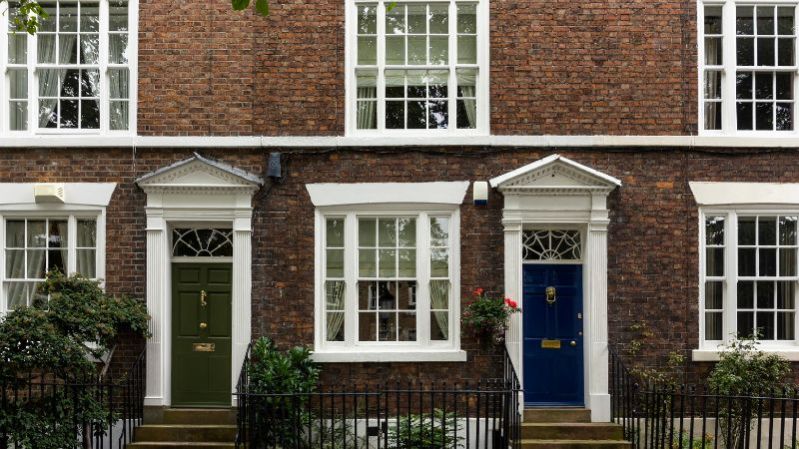What is Structural Warranty Insurance?
Structural warranty insurance differs significantly from standard home insurance cover that’s familiar to most homeowners, such as buildings insurance or contents insurance.
These alternative insurance products focus on the damage caused by external factors, such as a fire or flood. By contrast, structural warranty insurance is specifically put in place to cover latent defects - issues that are due to the construction of the property that are not immediately obvious at the time of construction but become a problem months (or even, years) later.
Examples include:
- Cracks in walls that are due to substandard building materials - These are problems caused by poor quality construction materials and thus fall under the umbrella of structural warranty insurance. Standard home buildings insurance would reject a claim to cover any repairs in this instance because the cracks haven’t occurred due to any external factor.
- Leaks that come about from faulty roofing - Another example of a problem that has come about because a mistake in construction, due to either poor workmanship or because the roof hasn’t been made from appropriate materials. While buildings insurance would cover damage to the roof that’s happened when a storm has dislodged tiles, or if a heavy tree branch falls onto the roof causing damage, it is for structural warranty insurance to cover this construction issue.
- Building collapse caused by poor design - Should a problem with the building construction (such as a load-bearing wall or beam failing), this could lead to the entire house falling down. Once more, without any external force being responsible, the financial burden of repairs (or rebuilding) would fall on structural warranty insurance rather than any standard home insurance.
Human Injury and Loss of Life
It is important to note that structural warranty insurance does not cover any financial compensation for injury or loss of life. Should a construction problem result in any human injury or worse, then a claim would need to be made separately to the construction company or individual, which would be paid from any professional liability insurance.
Building Contents
The scope of structural warranty insurance is limited to paying for repairs (or a rebuild) of the building itself and there is no cover provided for any items in the building that may be damaged or destroyed from a structural defect.
A comprehensive home contents insurance plan is needed to cover such eventualities and it is worthwhile for anyone with particularly valuable items to consider the full terms of their insurance and ensure they are properly covered in all eventualities.
Who Needs Structural Warranty Insurance?
Structural warranty insurance is a product that meets the needs of those undertaking building construction projects. It is essential for:
Property developers - Companies whose business is in building construction need comprehensive tailored structural warranty insurance to:
- Provide financial indemnity against future disputes.
- Offer homebuyers additional guarantees
- Protect investment
- Solidify brand reputation
Self-Builders - Those undertaking a new self-build project will need structural warranty insurance for their own peace of mind and protection. Additionally, a structural warranty is typically a requirement for obtaining a self-build mortgage.
Lenders and Investors - Any professional body investing or providing funding for a construction project will look to structural warranty insurance to protect their interests.
It’s important to understand that structural warranty insurance is more than just a formality. The security and peace of mind that it offers is because it represents a tangible financial safeguard should anything prove problematic with the building construction.
Without a structural warranty, property owners can find themselves facing considerable repair costs, as well as becoming involved in unwanted legal disputes. Similarly, for builders and property developers, the insurance provides the necessary protection for them to be able to undertake the building projects without unwarranted concerns for the future.
How Structural Warranty Insurance is Assessed
It is important for structural warranty underwriters that a full assessment takes place throughout the construction process. For this reason, an application for structural warranty insurance is initiated at the very start of the building construction.
Risk assessment for structural warranty insurance is essential for the underwriters to determine the correct level of cover and appropriate premiums, as well as to ensure that all standards are being met.
- Application - From the beginning, during the application for structural warranty insurance, the construction plans and builder credentials will be thoroughly considered.
- Inspections - At key stages, surveyors will undertake site inspections of the build process. This ensures that everything is being done correctly, with a particular focus on compliance with all relevant building standards.
- Completion - Upon the building’s completion, a final inspection will take place and the warranty is approved.
This is often for the first two years following the completion date. Full insurance cover begins once the defect liability period has passed and covers all eligible structural defects for the length of the term (often ten to twelve years).
Core Structural Warranty Insurance Products
Structural warranty insurance is an umbrella term that covers a broader range of specialised products. These include:

Latent Defect Insurance
This is the specific name for the type of insurance that covers construction defects that are not discovered until months or years after the building is completed. It is essential for developers and property owners who need comprehensive insurance protection against structural problems.

New Build Warranty Insurance
Tailored for property developers, a new build warranty ensures that newly constructed homes come up to the appropriate standards, providing the financial support should anything go wrong, as well as providing potential buyers the reassurance they need to move forward with a purchase.
Mortgage lenders representing buyers will be keen to see that new build warranty insurance is in place before agreeing to release funding.

Self-Build Warranty Insurance
With specific understanding for those who have built their own home, self-build warranty insurance provides protection that begins at the very early stages of a self-build, taking the project from conception to completion and beyond.
It gives potential lenders the assurances they need to provide self-build mortgages and gives ongoing security throughout the first years of the building’s use.

Professional Consultant Certificate
The PCC is a certificate of compliance approved by UK Finance for use in mortgage lending. The PCC will only be issued when the professional consultant is satisfied the building has been built to the approved standards.
Apply for Structural Warranty Insurance
Finding the perfect warranty partner can be difficult and stressful. At Clifton Private Finance, we have established relationships with leading insurers and warranty providers, enabling us to secure the most competitive rates for you.
Our specialist advisory team will work with you to identify the full spread of insurance needs for your project - whether that’s a self-build, home renovation, or large-scale development.
We can lift the administrative burden, ensuring that the whole process of warranty application is efficient and worry-free. With in-depth knowledge of the complexities of structural warranty insurance, we’ll support you throughout the process, making sure you get the best structural warranty deal possible.
If you are considering a building development, Clifton Private Finance can help you meet regulations and secure financial backing at every stage of the project. Contact us today to learn more about how we can help with warranties, specialist mortgages, and ongoing funding to make your building dreams a reality.









